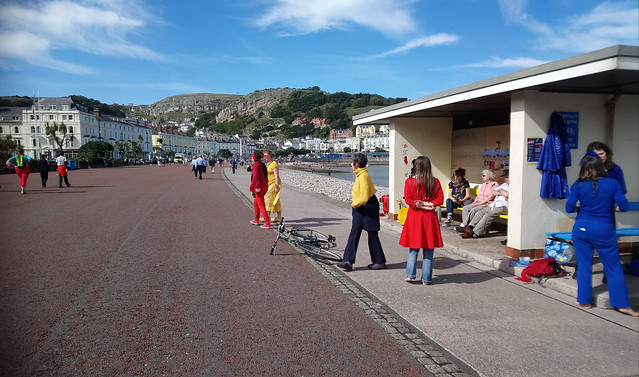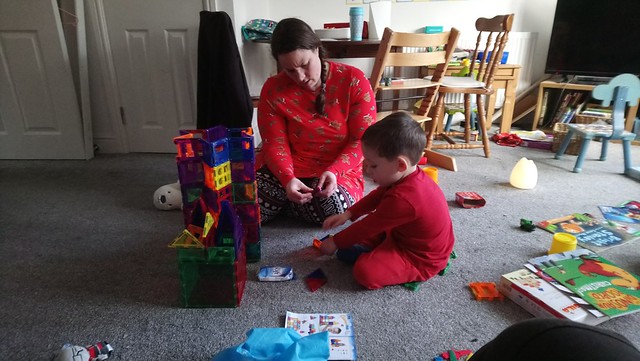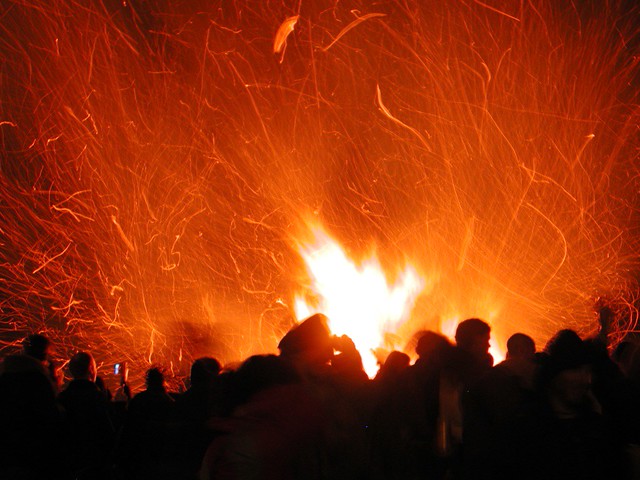Words for person, people and related words in Celtic languages.

| Proto-Celtic |
*gdonyos = person |
| Old Irish (Goídelc) |
duine [ˈdunʲe] = person
duineta = human
dóenacht [ˈdoːi̯naxt] = humanity |
| Middle Irish (Gaoidhealg) |
duine = human, human being, man, mankind, person |
| Irish (Gaeilge) |
duine [ˈd̪ˠɪnʲə] = human being, man, mankind, person, people, one
duineata = human, kindly
duineatacht = humaneness, kindliness
duiniúil = human, natural, kindly
duiniúlacht = humanity, kindliness |
| Scottish Gaelic (Gàidhlig) |
duine [dɯn̪ʲə] = fellow, person, man, husband, (any)one
daonnachd [dɯːn̪ˠəxg] = humanity, charity, benevolence, liberality, hospitality
duine-uasal = gentleman |
| Manx (Gaelg) |
dooinney [ˈd̪uːnʲə] = human, man, fellow, husband
deiney = human, man, menfolk
dooinnalys = humanity, human nature
dooinnidaght = humaneness |
| Proto-Brythonic |
*dün [ˈdyːn] = human, person |
| Middle Welsh (Kymraec) |
din, dyn = man, human being |
| Welsh (Cymraeg) |
dyn [dɨːn / diːn] = man, human being; person, one, anyone; mankind, the human race; manservant, vassal; manly or competent person
dynes [ˈdənɛs] = woman
dynegwr, dynegydd = anthropologist
dynfarch [ˈdənvarχ] = centaur
dyneidd(i)o = to render man-like or human, personify, humanize, civilize, tame, refine
dyneiddiol = humanistic, humanitarian, humanizing, civilizing |
| Old Cornish |
den = man, person |
| Cornish (Kernewek) |
den [dɛ:n / de:n] = man, guy, human, person
dengerenjedhek, dengerensedhek = humanitarian
denladh = homicide, manslaughter
denladhyas = assassin, killer, murderer
denses = humanity |
| Old Breton |
den / don = man, person |
| Middle Breton |
den = man, person |
| Breton (Brezhoneg) |
den [ˈdẽːn] = human being, person, man, husband |
Etymology: from the Proto-Indo-European *dʰéǵʰom-yo- (earthling, human), from *dʰéǵʰōm (earth), which is also the root of the English words human, humus and (bride)groom [source].
| Old Irish (Goídelc) |
popul [ˈpobul] = people; tribe, nation, inhabitants; folk; populace, crowd |
| Middle Irish (Gaoidhealg) |
popul = people |
| Irish (Gaeilge) |
pobal [ˈpˠɔbˠəlˠ / ˈpˠʌbˠəlˠ] = people, community; parish, congregation; population
pobalscoil = community school
poblacht = republic
poblachtach = republican
teach pobail = church, chapel
teange an phobail = vernacular |
| Scottish Gaelic (Gàidhlig) |
poball [pobəl̪ˠ] = folk, people; community; laity, lay people
poballach [pobəl̪ˠəx] = popular, populous
poblachd [pɔbl̪ˠəxg] = republic |
| Manx (Gaelg) |
pobble = people, population, community, folk, congregation, masses
pobbylagh = public, populous
pobblaght = republic |
| Proto-Brythonic |
*pobl = people |
| Middle Welsh (Kymraec) |
pobyl = people |
| Welsh (Cymraeg) |
pobl [ˈpʰɔbl̩ˠ / ˈpʰɔbl̩] = people, public, nation, tribe, crowd, inhabitants
pybl = people, the common person, folk
poblog = populous, peopled, populated; popular, acceptable; common
poblogaeth = population, populousness
poblogedig = populated, inhabited
poblogeiddio = to popularize
poblogi = to populate, people, inhabit; to popularize |
| Old Cornish |
popel = people |
| Cornish (Kernewek) |
pobel = people
pobla = to populate
poblans = population
poblansorieth = demographics
poblansoriethek = demographic |
| Breton (Brezhoneg) |
pobl = people, multitude |
Etymology: from the Latin populus (people, nation, community), from the Proto-Italic *poplos (army) [source].
Words marked with a * are reconstructions.
Sources: Wiktionary, Am Faclair Beag, Online Manx Dictionary, Teanglann.ie, eDIL – Electronic Dictionary of the Irish Language, In Dúil Bélrai English – Old Irish glossary, Geiriadur Prifysgol Cymru, Gerlyver Kernewek, Gerlyvyr Cernewec, Dictionaire Favereau, TermOfis, Le dictionnaire diachronique du breton, Geriafurch, English – ProtoCeltic WordList (PDF), Etymological Dictionary Of Proto Celtic









